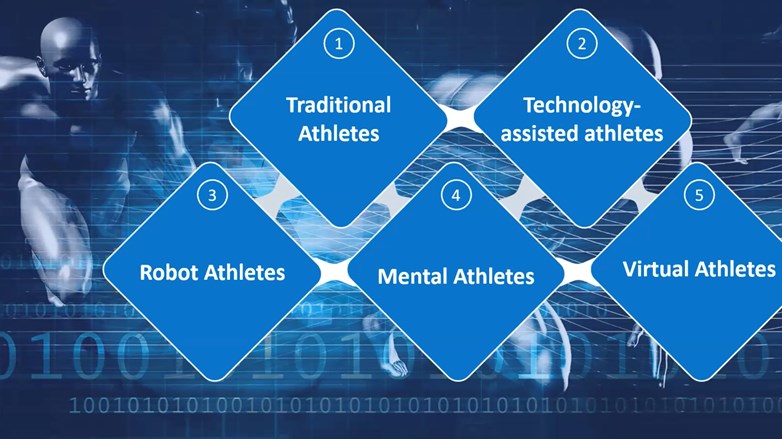21st Century Sports: How Technologies will Impact Sports in the Digital Age
Participants
During the event titled "21st Century Sports: How Technologies will Impact Sports in the Digital Age", the directors for the respective Sports and Business/Management Research Centers shared their views on technology's impact on sports, namely Karoline Strauss (Professor and ESSEC Sports Chair), Martin Carlsson-Wall (Associate Professor and Director for the SSE Center for Sports & Business) and Sascha Schmidt (Professor and Director/Chair at WHU Center for Sports and Management).
The event started with a brief presentation of each of the respective sports research centers.
The WHU - Otto Beisheim School of Management Center for Sports and Management
WHU's Center for Sports and Management (CSM) and Sports Business Academy (SPOAC) were founded in 2014. The CSM's research and teaching activities center around future readiness, corporate diversification strategies, the impact of technologies on sports and stadium economics. Further, they have partnerships with Massachusetts Institute of Technology (MIT) for their xPRO executive education platform and The Laboratory for Innovation Science at Harvard University. Research cooperation also spans to the University of Reading and Queensland University of Technology.
WHU Center for Sports and Management and SSE Center for Sports & Business are together involved jointly in a EU-funded program together with the Zagreb School of Economics and Management designing an online program for especially Olympic athletes looking for entrepreneurship opportunities during or after their careers. You can read more about the Micro-Learning Entrepreneurship for Athletes program here.
The ESSEC Sports Chair
The ESSEC Sports Chair was founded in 2020 and they offer specializations to students within ESSEC programs. Formerly, ESSEC also had a Sports Marketing Chair. Partnerships include Allianz, EDF, Paris Saint-Germain, Stade Francais Paris, French Federation of Basketball, National Institute of Sport, Expertise and Performnace, and Sports dans la Ville. Topics of focus include career transitions in professional sport, but also more applied knowledge from case studies regarding leadership lessons learned from sport, among others. They are also currently putting effort into their Sports Hub, in order to give current and retired athletes access to ESSEC courses.
The SSE Center for Sports & Business
SSE's Center for Sports & Business (CSB) was founded in 2015 and has strategic partnerships with the Swedish Olympic Committee and many of the large sports (i.e., football, hockey, golf, equestrian, trot racing, skiing and parasport). A central research theme concerns the management of hybrid organizations and how sports organizations balance commercial and non-commercial logics. CSB offers educational programs to athletes, students and sports executives.
21st Century Sports: How Technologies will Impact Sports in the Digital Age
Next, the focus was on the main topic of the event: 21st Century Sports: How Technologies will Impact Sports in the Digital Age.
In his keynote speech, Professor Sascha Schmidt from WHU shared the key insights from his book 21st Century Sports: How Technologies Will Change Sports in the Digital Age, which outlines the effects that technology-induced change will have on sport within the next five to ten years.
Firstly, Professor Schmidt alluded to Human vs. Human supported by technology. In this case, technology is used to improve performance as well as rehabilitation. Data is used for a better competitive position. Today, all professional clubs have their own data scientists and rely on data in order to achieve a 360 degree perspective of a player through medical, match, training and psychological data.
Furthermore, Sascha Schmidt noted that humans will be able to compete against their digital twins or virtual opponents in ten years' time. Also, new records will be broken in Paralympics due to technological innovations.
Concerning the field Man vs. Machine, there is a future where humans compete against humanoid robots. Humans competed against machines is something that already has taken place, as Sascha Schmidt exemplified through the cases Gari Kasparov against Deep Blue in chess (1996), Lee Sedol against AlphaGo in the board game Go (2016) as well as Boll against Kuka in table tennis (2014).
Next, regarding Machine vs. Machine, the question becomes where is the added value compared to human competitions. As Sascha Schmidt explained, this could potentially be due to the possibility of a fight for survival without ethical boundaries, a total destruction of machines. Previous examples include the so-called Robot wars, Blacksmith against Minotaur (2014), the Gaint Robot Duel between the US and Japan, but also competitions where machines compete without any human intervention, such as RoboRace (AI-controlled racing car) and RoboCups (autonomous football robots fighting against each other).
As Professor Schmidt noted, the future with technological development might also hold that robots will be able to beat humans in, for instance, football.
Moreover, future athlete categories can be divided into five different types:
- Traditional athletes
- Technology-assisted athletes (Paralympic athletes and conventional athletes using robotic suits that support movements of the athlete)
- Robot athletes (human-controlled or fully autonomous)
- Mental athletes (athletes that compete in mental competitions, e.g. chess or E-sport)
- Virtual athletes (holograms created and controlled by algorithms, having competitions between software developers and engineers)
However, which categories that will exist and be successful is dependent on fans and consumers’ choices. One overarching theme for consumers and fans is participation. For instance, new type of Leagues emerge such as the fan-controlled football league with fans having full control over i.e. the logo, transfer decisions, coach, and players. This is about active consumption of sports made possible through crypto currency and NFTs. Further, we also experience ehancement of artificially-created pictures (e.g. FIFA video games) as well as the Metaverse (e.g. Manchester City creating a virtual Etihad Stadium).
Q&A
During the Q&A, it was further discussed where disruption might take place. This could be in either traditional sports or organizations, but both Sascha Schmidt and Martin Carlsson-Wall also see the potential of entirely new sports or sports organizations. Further, as Sascha Schmidt explained, younger people will not see this in categories, rather, they will see sports as part of a larger entertainment universe.
Also, the demand for some technological innovations was discussed, such as virtual athletes. This connects to the purpose of sports and what drives passion, i.e. authenticity. The more you bring in technology, the more you potentially take away historical memories, authenticity and how it used to be. Thus, it could also be framed as how one saves sports from the potential dilution of the properties of sports, as Carlsson-Wall discussed.
Professor Sascha Schmidt concluded this topic with the notion that the hard trend is that technology will come. But, the soft trend is how do we handle that and, if we want technology, how do we regulate it?
Lastly, technology can also help to democratize sports through technology diffusion. For instance, automated, AI-steered cameras that record 6th League games. With motion-tracking technology in use, even clubs in a very low league can retrieve data analysis from the game and conduct professional scouting on that league level, constituting an advancement for leisure sports.
Next Steps
On March 16th, Karoline Strauss from ESSEC is going to talk about developing talent in sports. More specifically, both the dark and bright side of helping young people to chase after their (un)realistic dreams of becoming professional athletes. She is going to share some best practices of some of ESSEC's partners such as PSG. Furthermore, she will also present a tool they are developing at the ESSEC Sports Chair to help athletes think about themselves as a whole person, that hopefull facilitates some of the transitions within and out of sports. Lastly, this will also help us to understand what we can learn from sports and careers of professional athletes about careers more generally.




